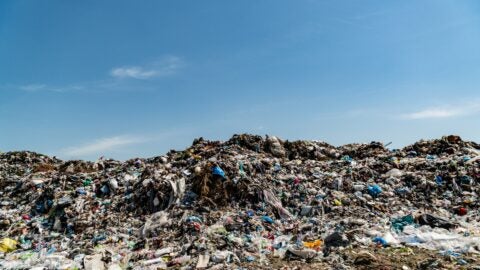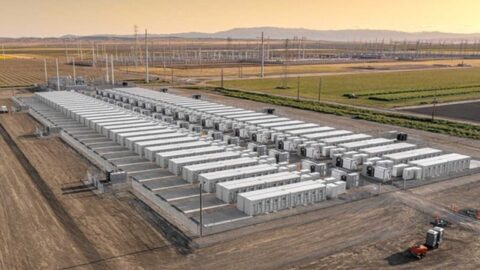The United States Supreme Court Hears the Other Side of the Story on California’s Cleaner Fuels Policy
 Yesterday, the Environmental Defense Fund, the Natural Resources Defense Council, the Sierra Club and the Conservation Law Foundation filed a brief in opposition to March 2014 petitions for Supreme Court review in American Fuel & Petrochemical Manufacturers Association v. Corey and Rocky Mountain Farmers Union v. Corey, cases in which oil and ethanol companies attack the constitutionality of California’s Low Carbon Fuel Standard (LCFS).
Yesterday, the Environmental Defense Fund, the Natural Resources Defense Council, the Sierra Club and the Conservation Law Foundation filed a brief in opposition to March 2014 petitions for Supreme Court review in American Fuel & Petrochemical Manufacturers Association v. Corey and Rocky Mountain Farmers Union v. Corey, cases in which oil and ethanol companies attack the constitutionality of California’s Low Carbon Fuel Standard (LCFS).
The LCFS, adopted under California’s trail blazing Global Warming Solutions Act, is a central contributor in the effort to move the transportation system away from the current paradigm of unsustainable global warming pollution, foreign energy dependence, and community-choking air pollution. The LCFS works by putting market incentives in place that encourage the production and use of low carbon fuels that were not prevalent when the program went into effect. It is projected to reduce greenhouse gas emissions from California’s use of transportation fuels by 16 million metric tons per year by 2020.
As we have explained in prior posts here and here about this important case, the challengers in the litigation have argued that the LCFS discriminates against ethanol and oil coming from outside of California and that it attempts to regulate actions occurring outside the state in violation of the U.S. Constitution’s Dormant Commerce Clause. A panel of the United States Court of Appeals for the Ninth Circuit rejected these arguments in September 2013. In their March 2014 petitions, the industry challengers seek Supreme Court review of the appeals court’s decision. The Supreme Court’s decision on whether to take the case could come as early as late June.
As yesterday’s brief shows, the petitions do not, in our view, meet the criteria for Supreme Court view. As explained in the brief, the court of appeals got it right in rejecting the challenges to the LCFS, and as to the claim that the LCFS discriminates against out-of-state ethanol producers:
“A State that sought to isolate its own ethanol industry from competition would not design a system like the LCFS, that rewards low carbon biofuels wherever they are produced, and that has assigned 39 of the 40 most favorable carbon intensity values (including the top 26) to products manufactured out of State.”
As the brief also explains, the challengers’ claims of discrimination rely upon a flagrant and misleading exercise in cherry-picking, protesting that a few producers of high-carbon-intensity fuels may fare worse than they might absent the LCFS – and completely ignoring the scores of out-of-state fuels that are now being offered in California, in many cases precisely because of the incentives the program creates to develop and offer cleaner fuels.
Nor, as our brief explains, does the LCFS regulate “extraterritorially”:
“Far from “controlling” wholly out-of-state transactions, the LCFS applies only to fuels sold in California for use in California and attaches no significance to producers’ sales of fuels (including high-carbon ones) to purchasers in other States and nations. Nor does it require or pressure other polities to adopt any laws or standards of any kind. The LCFS alters the incentives of firms (whether in-state or out-of-state) producing fuels used in California, but does not differ in that respect from state regulations universally recognized as constitutional.”
Furthermore, as our brief explains, the petitions do not satisfy the recognized criteria for Supreme Court review for other reasons too — perhaps most importantly, the Ninth Circuit’s decision does not conflict with any decision of any other court.
In considering this latest chapter in another industry’s attacks on California’s nation-leading climate policies, it is important not to lose sight of the ‘big picture’ – the compelling, sobering realities that persuaded California’s people and leaders to adopt these important protections. California continues to be burdened by climate pollution that threatens farmlands, coastlines, forests, and imperils the water supplies that are the State’s lifeblood. At the same time, poor air quality, much of which comes from cars and trucks, and which is exacerbated by a warming climate, has made the Golden State home to the top five most polluted cities in the country.
According to a recent report by EDF, Driving California Forward, the combined economic damage from transportation system pollution is nearly $25 billion per year. The LCFS, through an innovative framework to encourage the development and deployment of cleaner lower carbon fuels, looks to break the transportation logjam. According to Driving California Forward, the LCFS works alongside other California policies to cut air pollution, reduce reliance of oil imported from foreign nations, and fight climate change. The LCFS has been consistently supported by legal and policy experts, alternative fuel companies, national security leaders, environmental groups, and others.
While the U.S. Supreme Court weighs whether to hear the case, the LCFS will be working to cut pollution and improve the transportation system, benefiting the environment and creating new opportunities across the landscape. The oil and ethanol interests who are attacking the LCFS are trying to protect the status quo, which they believe is more favorable to them than the LCFS’s innovation-rewarding standards. But the planet, and its inhabitants, deserve better.
All of the briefs in this case can be found here.













